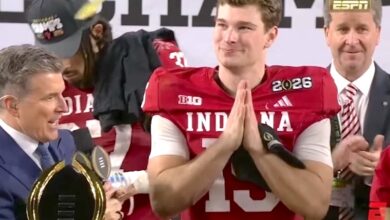Kansas State and NFL receiver Tyler Lockett values trust and creativity
Tyler Lockett is a versatile NFL talent, an instinctive and creative playmaker as both a receiver and a Pro-Bowl returner! Lockett shows his heart, not only making plays on the field, but also using play on words as a hope-filled Spoken Word poet. “What it is you want to say to be able to get them to see your side of the perspective,” says Tyler, “to be able to impact everybody at the place that they’re at – kids, adults, anybody!”
Like his oratory art, the former K-State standout’s impact with the football provides him room to create.
Question: “What’s the mindset, what’s the view you have when you get the ball on a return?”
Tyler: “All I see is open space! Obviously, we have a game plan, we have holes that are supposed to be open, you got to be able to learn how to set it up and learn how to be able to trust everybody around you. It’s about setting up the blocks. And so you just got to learn how to be creative in a way that you do it, but also to be able to put yourself in a position to help the team be successful!”
Question: “So, Tyler, how does the skill, from both of your positions as a returner and as a receiver, what does it provide you in the other role?”
Tyler: “First I think it helps you with value ‘cuz in the NFL it’s all about the more that you can do! To be able to be a receiver and do both returns it kind of gives you a position to be able to be on that depth chart. Whenever you look at the return game it helps you to be able to transition – when you have a ball in your hands it’s on you! You make everything happen whether you catch it or whether it’s a reverse – is your turn it into a punt return!”
Question: “It does seem like there’s a lot of creativity – and that hits your sweet spot, right? Are there similarities between you as a poet and you as a football player?”
Tyler: “You’ve got to be able to be creative. But I think you’ve got to make people believe what you’re doing and I think that’s the biggest thing because the way you run routes, if you try to give like a little nod – they gotta believe it! So, in my poetry – if I don’t believe it, if I don’t think it sounds good enough – then I know they aren’t going to think it sounds good enough or they’re not going to believe it.”
Question: “What is the pondering in the expression of Spoken Word, for you?”
Tyler: “In my Spoken Word, instead of me pointing at other people, I put it all in my shoes because it’s easier for someone to relate! It takes away any type of feelings that people had towards not wanting to accept it because it’s not now anything going after them. They can grasp what you’re saying and so I try to put it to where everybody can relate and understand!”
Question: “What would be the best thing to happen – where and how do you want it to impact?”
Tyler: “I don’t always put the hope in the message but there are other times that I do! You know, I had a friend talking about committing suicide – and I had put that in a poem. In order to get him out of the dark, you gotta turn on the light so he can be able to see what it is about his life that people appreciate, and how his life is important and impactful to everybody else around him! So, it’s like little analogies so people can be able to get it and understand.”
Question: “How do you live what you preach?”
Tyler: “Being able to keep yourself accountable! I mean, if you don’t have that accountability, if you don’t have somebody there to push you or help you, you gotta learn to be able to push or help yourself because at some point in time you’re going to be isolated. The closer you get to God the easier it is for you to change because it just happens. It’s not like you’ve got to force yourself to do it! That’s all it’s about – being you and being able to get closer to God!”
Question: “Spoken Word. Scripture’s referred to as The Word. Does scripture look or sound differently to you?”
Tyler: “You see what scripture says to that situation, to now where you could try to add certain things into your poems, so where people are like, ‘Oh wow, you know, okay.’ I think when you read The Word you start seeing the little things and how it does affect your life.”
Question: “How has your companionship with Him – your savior – how has that shaped you?”
Tyler: “To me honestly, He’s everything! You’re going to get to the point where it’s like, ‘there has to be more!’ What is it that’s going to keep me going? Or what is it that gives me a purpose? Not to be depressed! And not to have anxiety! Or not to be fearful of death! The one thing that keeps you going is to have faith in God and that Jesus came and died for everything. He’s given you the things that you need to live a fulfilled, thankful life!”
- CBN







